北师大版(2019)必修 第三册Unit 9 Learning Lesson 3 The Secrets of Your Memory单元语法详解课件(36张ppt)
文档属性
| 名称 | 北师大版(2019)必修 第三册Unit 9 Learning Lesson 3 The Secrets of Your Memory单元语法详解课件(36张ppt) |
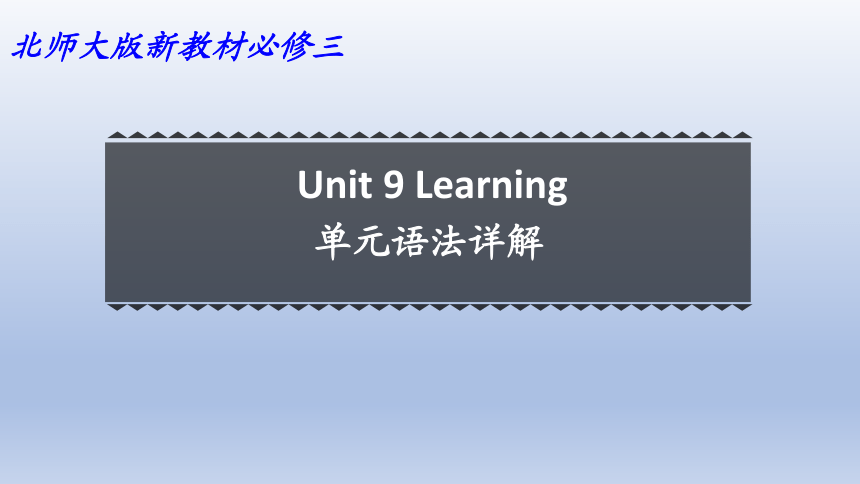
|
|
| 格式 | pptx | ||
| 文件大小 | 1.4MB | ||
| 资源类型 | 教案 | ||
| 版本资源 | 北师大版(2019) | ||
| 科目 | 英语 | ||
| 更新时间 | 2023-03-07 00:00:00 | ||
图片预览




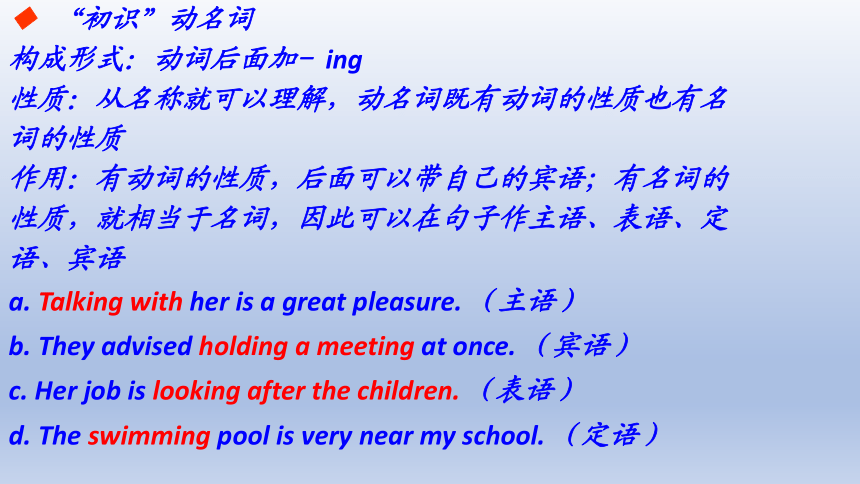

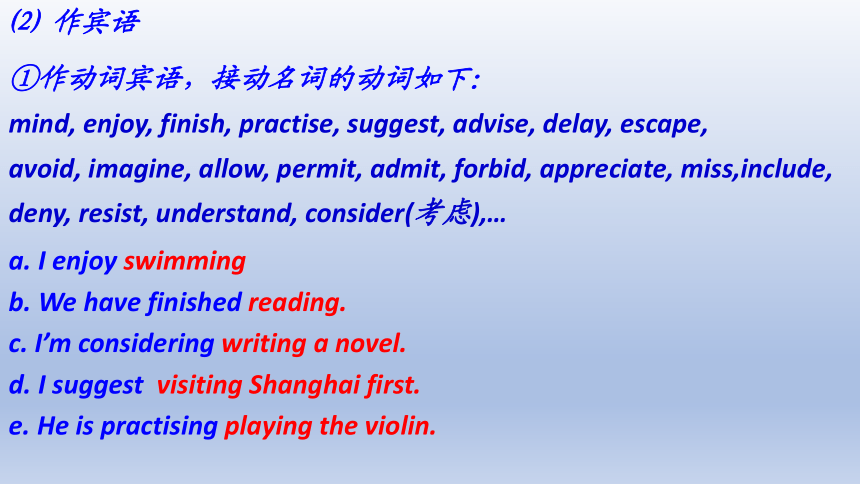

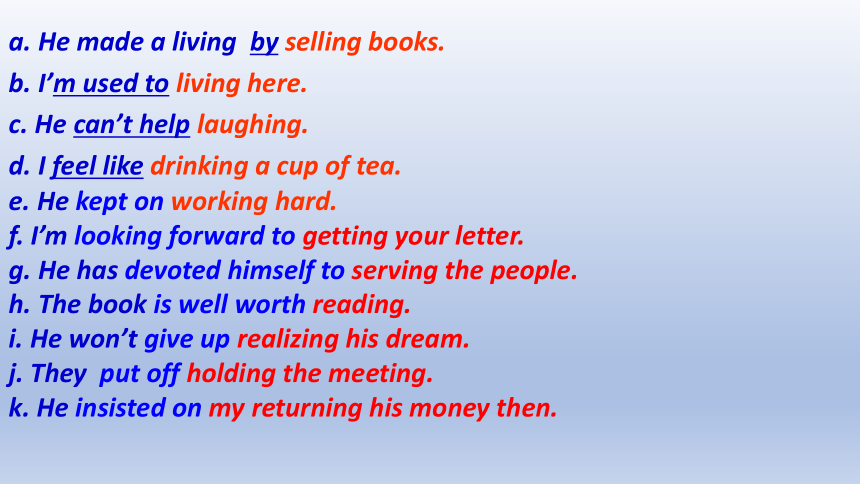

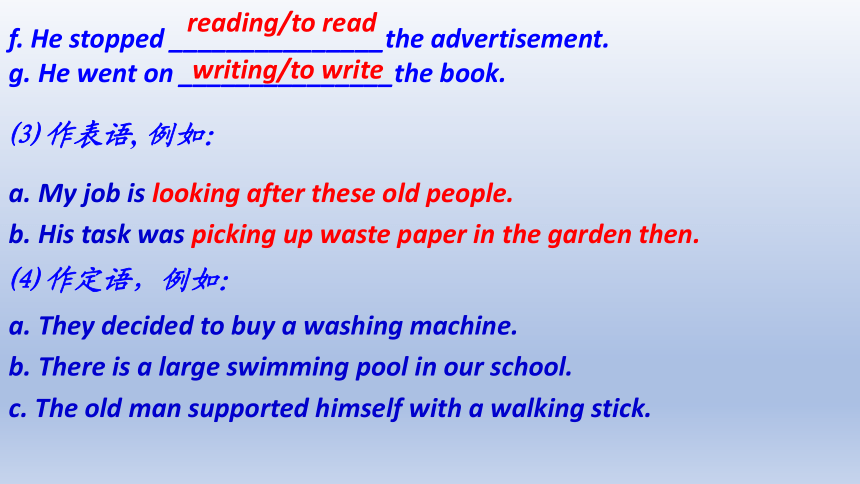

文档简介
(共36张PPT)
Unit 9 Learning
单元语法详解
北师大版新教材必修三
动名词和动词不定式
本单元重要语法
◆原句再现
a. We need to train ourselves to be better learners – to actively take
part in the learning process and to reflect on … (教材 P 52)
b. I suggest doing five things to take an active role in the learning. (教
材 P 52)
c. If you keep paying too much attention to your inner voice, you will
risk missing important information. (教材 P 53)
d. Asking questions is the easiest way to promote active learning. (教
材 P 53)
e. They refuse to learn or ignore what is said because of who the
speaker/writer is. (教材 P 53)
f. It is true that we cannot help disliking some people—this is human
nature, after all. (教材 P 53)
动名词
◆ “初识”动名词
构成形式:动词后面加- ing
性质:从名称就可以理解,动名词既有动词的性质也有名
词的性质
作用:有动词的性质,后面可以带自己的宾语;有名词的
性质,就相当于名词,因此可以在句子作主语、表语、定
语、宾语
a. Talking with her is a great pleasure. (主语)
b. They advised holding a meeting at once. (宾语)
c. Her job is looking after the children. (表语)
d. The swimming pool is very near my school. (定语)
◆“一次看够 ”动名词
⑴ 作主语,例如:
a. Swimming is my favorite sport
b. Seeing is believing
c. Choosing what to eat is not as easy as before
d. Smoking does harm to your health
e. Not getting good marks made him angry
f. Parking is not allowed here
g. Teaching is my job.
h. It’s no use regretting your past mistakes.
i. It is no good smoking
j. It’s useless studying English without practice.
⑵ 作宾语
①作动词宾语,接动名词的动词如下:
mind, enjoy, finish, practise, suggest, advise, delay, escape,
avoid, imagine, allow, permit, admit, forbid, appreciate, miss,include, deny, resist, understand, consider(考虑),…
a. I enjoy swimming
b. We have finished reading.
c. I’m considering writing a novel.
d. I suggest visiting Shanghai first.
e. He is practising playing the violin.
f. They don’t allow smoking here.
g. I appreciate being invited to the party.
h. Do you mind my/me/Tom’s opening the door
i. Can you imagine skating on such a ground
j. He can’t escape/avoid being punished.
②作介词或某些动词固定搭配的宾语
敬请关注这些固定词组:put off, give up, feel like, look forward to, keep on, devote…to…, be worth… , insist on, pay
attention to, can’t help (禁不住), be / get used to (习惯), get down to, think of, think about, set about, object, …例如:
a. He made a living by selling books.
b. I’m used to living here.
c. He can’t help laughing.
d. I feel like drinking a cup of tea.
e. He kept on working hard.
f. I’m looking forward to getting your letter.
g. He has devoted himself to serving the people.
h. The book is well worth reading.
i. He won’t give up realizing his dream.
j. They put off holding the meeting.
k. He insisted on my returning his money then.
l. I think of having done my homework.
m. You should pay attention to finding out the reason.
n. I’m setting about going over my lessons.
q. Get down to doing your homework!
◆慧眼看穿“动名词”:易混点选编
a. I forget __________(meet) him before.
b. I regret ____________ (miss) the early bus.
c. I remember ____________ (take) to Beijing when young.
d. The wall needs ____________________________ (repair).
e. I am afraid _______________ (fall) off the tree.
meeting
missing
being taken
repairing / to be repaired
of falling
f. He stopped _______________the advertisement.
g. He went on _______________the book.
reading/to read
writing/to write
⑶ 作表语, 例如:
a. My job is looking after these old people.
b. His task was picking up waste paper in the garden then.
⑷ 作定语,例如:
a. They decided to buy a washing machine.
b. There is a large swimming pool in our school.
c. The old man supported himself with a walking stick.
◆动名词和现在分词作定语时的区别
⑴ 现在分词作定语
① 说明被修饰名词的性质特征,例如:
a boring lesson / an interesting story
an exciting film / the surprising ending
② 表示动作主动和正在进行, 例如:
boiling water / a flying kite / the rising sun / running water
a sleeping cat / a dancing girl / a swimming person …
⑵ 动名词作定语说明被修饰名词的用途, 例如:
a swimming pool / a walking stick / a washing machine / a reading room / the waiting room / the operating table / a sleeping bag …
◆it 作形式主语时也可以代替动名词,但常用在一些固定结构中,例如:
a. It is no good doing something.
b. It is no use doing something.
c. It is no good eating too much fat.
d. It is no use saying these words.
◆某些动词或词组后接动名词和动词不定式表达不同意义,例如:
stop to do something. (停止原事去做另一事,表目的)
stop doing something. (停止正在做的事情)
go on to do something.(停止原事继续做另1事,表目的)
go on doing something. (继续做另一件事儿)
try to do something. (尽力做某事)
try doing something. (试着做某事)
mean to do something. (打算做某事)
mean doing something. (意味着做某事)
remember/forget/regret to do something. (没发生)
remember/forget/regret doing something. (已发生)
can’t help do something. (不能帮助做某事)
can’t help doing something. (禁不住做某事)
悄悄告诉你:当表达 “某物需要(被)做” 时, 常用下面三个动词
后接动名词的主动形式或动词不定式的被动形式, 即:
某物 + want / need / require to be done.
某物 + want / need / require doing.
例如:
a. My bike needs repairing / to be repaired.
b. This machine wants checking / to be checked.
◆动名词的复合结构
形容词性的物主代词或名词所有格 + 动名词构成动名词的复合结
构,例如:
a. Would mind his coming late for the meeting
b. Tom’s getting up early made his father happy.
温馨提示:动名词复合结构在作主语时,须用名词或代词所有格;
作宾语时,也可用普通格或人称代词宾格,例如:
a. Tom’s (His) coming made us very excited.
b. I didn’t mind Jack/ Jack’s (him / his) coming late.
◆动名词的否定形式
动名词前加 not 构成否定形式,例如:
a. Not having received a reply made him mother disappointed.
b. Not working hard is completely wrong.
◆考点训练
用括号内动词的适当形式填空
1. Alice has delayed _____________( write ) to her till today.
2. The country forbids _________ ( sell ) these books to the
children.
3. Can you imagine _________(stand) in the sun for a whole
day
writing
selling
standing
动词不定式
◆ 动词不定式构成:
●一般式:to + do (动词原形)
●被动式:to be done
●进行式:to be doing
●完成式:to have done
●完成被动式:to have been done
●动词不定式否定须在不定式前加 not 或 never
◆动词不定式的功能:
在句中可作主语、表语、宾语、宾语补足语、定语和状语
● 作主语
这 时可用 it作形式主语 代不定式放句首,不定式后移, 请观察以下句子
a. It is my dream to be here at Christmas time.
b. It is his dream to go abroad.
c. It is easy to say, it is difficult to do.
= To be here at Christmas time is my dream.
= To go abroad is his dream.
= To say is easy, to do is difficult.
d. It is very important to learn English well.
= To learn English well is very important.
e. It is necessary to attend the meeting.
= To attend the meeting is necessary.
※ 请关爱以下两个结构:
① It’s + 形容词 + of + sb. + to do sth.
② It’s + 形容词 + for + sb. + to do sth.
※ 轻轻告诉你:当形容词表示人的性格或品质时用介词 of; 否则用 for, 表示人性格或品质的形容词有: clever, wise, kind, friendly, cruel
, foolish, silly, stupid, careless, warm-hearted, …
请观察以下句子
a. It is hard for you to do it well.
b. It is friendly of you to help me.
c. It is possible for them to finish the job in two hours.
d. It is unwise of her to do so.
※ 疑问词 who, what, which, where, when, how + to do可构成不定式短语, 在句中可用作主语、宾语、宾语补足语、表语等, 请观察以下句子
a. When to start has not been decided. (主语)
b. I don’t know what to do. (宾语)
c. He can tell you where to get the book. (宾语补足语)
d. The question is who (m) to ask. (表语)
●作宾语
a. I want to buy a computer.
b. She hopes to find a better job.
c. I wish to go with you.
※ 轻轻告诉你:以下动词后常接不定式作宾语
decide, refuse, pretend, agree, determine, want, expect, hope, wish,
manage, promise, choose, plan, beg, 请观察以下句子
a. The engineer refused to give in to the company.
b. I promised to buy him a computer yesterday.
c. At last he chose to leave the factory.
d. We managed to get in touch with the old man.
e. The boy pretended to be reading then, but in fact, he didn’t.
●作宾语补足语
a. She asked me to help her.
b. The teacher told him to come on time.
c. John’s mother taught him to read and write.
※悄悄告诉你:类似结构较多,请观察以下机构
want sb. to do/wish sb. to do/advise sb. to do/ beg sb. to do/get sb. to do/order sb. to do/expect sb. to do/would like sb. to do/help sb. to do
…
※ 温馨告知:有些动词后接宾语时不定式作宾语补足语不带 to,主要有以下两种动词:
※ 使役动词: let, make, have,请观察以下句子
a. The teacher made/had our monitor clean the blackboard.
b. Please let me do the job.
※感官动词: see, watch, hear, feel, listen to, notice, observe, look at等,请观察以下句子
a. I saw them play on the playground at that time.
b. My father noticed the little boy enter the cave.
※轻轻告诉你:这些感官动词接宾语后,宾语补足语也可以是现在分词或过去分词,但意义完全不一样,请观察以下句子
a. I heard her sing in the next room.
我听见她在隔壁唱歌了(唱歌的动作已经发生过了)
b. I heard her singing in the next room then.
当时,我听见她正在隔壁唱歌(唱歌的动作正在发生)
c. He felt his arm touched suddenly.
他感觉到他的胳膊突然被碰了一下(表示被动)
d. I saw him come into the classroom.
我看见他走进了教室(动作已经发生且为主动)
e. I saw him coming into the classroom.
我看见他正走进教室(动作正在发生)
f. I saw him beaten.
我看见他挨打了 (表示被动)
●试试看
a. I often see him dance on a small square.
→ He is often seen _____________ on a small square.
b. We heard the lady sing in the park just now.
→ The lady was heard _____________ in the park just now.
c. The boss made them work day and night.
→ They were made _______________ day and night.
to dance
to sing
to work
※ 从以上试题可以看出:当使役动词和感官动词接宾语和不带 to 动词不定式作宾语补足语时,如果把句子变为被动语态,原来不带 to的动词不定式需要加上 to. 即:sb. + be done + to do sth.
●作状语
a. He came to show me his new CD player. (表示目的)
b. I went there to see my teacher. (表示目的)
c. She came back to get her English book. (表示目的)
d. The boy was too frightened to move. (表示结果)
※ 动词不定式作目的状语时, to do 可以换成 so as to do/in order to do, 但是,so as to do 不能位于句首, 请观察以下句子
To improve English, she works harder than ever.
= In order to improve English, she works harder than ever. (这里不能换成 so as to improve…)
= She works harder than ever in order to/ so as to /to improve English.
●作表语
a. His work is to feed the animals.
b. Our plan is to help the children in the poor areas.
c. My wish is to be a scientist.
d. His dream is to go to a famous university.
e. The writer’s aim is to write two books in a year.
●作定语(这时不定式与被修饰词有动宾关系,若是不及物动词,介
词不能省略)
a. Give me something to drink.
b. They have much food to eat.
c. He asked for a room to live in. (这里 in 不能少)
d. The ice is hard enough to skate on. (这里 on 不能少)
1. Our headmaster often told us ______ things for granted.
not to have B. not to take
C. didn’t take D. not to make
2. The boy wanted to ride his bicycle in the street, but his
mother told him _____.
A. not to B. not to do C. not do it D. do not to
3. Mrs. Smith warned her daughter _______ after drinking.
never to drive B. to never drive
C. never driving D. never drive
4. The patient was warned _______ oily food after the operation.
to eat not B. eating not C. not to eat D. not eating
◆ 考点训练
B
A
A
C
5. The workers want us ________ together with them.
A. work B. working C. to work D. worked
6. They would not allow him __________ across the enemy line.
A. to risk going B. risking to go
C. for risk to go D. risk going
7. I saw him _______ out of the room.
A. go B. had gone C. has gone D. goes
8. I’ve heard him _______ about you often.
A. spoke B. speaks C. speak D. spoken
9. He doesn’t have to be made _______. He always works hard.
A. learn B. to learn C. learned D. learning
C
A
A
C
B
10. Though he had often made his little sister _____, today he was
made _____ by his little sister.
cry;to cry B. crying;crying
C. cry;cry D. to cry;cry
11. She couldn’t decide which restaurant _______.
A. to have lunch B. to eat
C. to eat at D. eating at
12. There isn’t any difference between the two. I really don’t know
______.
A. where to choose B. which to choose
C. to choose what D. to choose which
A
c
B
13. “ Have you decided when ____ ” “ Yes, tonight.”
A. to leave B. to be leaving
C. will you leave D. are you leaving
14. Last summer I took a course on ________.
A. how to make dresses B. how dresses be made
C. how to be made dresses D. how to be made
15. He doesn’t know ______ to stay or not.
A. whether B. if C. either D. if he will
16. She pretended ______ me when I passed by.
A. not to see B. not seeing
C. to not see D. having not seen
A
A
A
A
17. -- The light in the office is still on. -- Oh, I forgot _____.
A. turning it off B. turn it off
C. to turn it off D. having turned it off
18. Little Jim should love _____ to the theatre this evening.
A. to be taken B. to take C. being taken D. taking
19. Go on ____ the other exercise after you have finished this one.
A. to do B. doing C. with D. to be doing
20. I would love _____ to the party last night but I had to work extra
hours to finish a report.
A. to go B. to have gone C. going D. having gone
21. She reached the top of the hill and stopped _______ on a big rock
nearby.
A. to have rested B. resting C. to rest D. rest
C
A
A
B
C
22. Tom kept quiet about the accident ______ lose his job.
A. so not as to B. so as not to
C. so as to not D. not so as to
23. I need a day or two ________.
A. to think it over B. to think over it
C. thinking it D. thought it over
24. He was too excited _________.
A. speak B. to speak C. not to speak D. speaking
25. Charles Babbage is generally considered _____ the first computer.
A. to invent B. inventing
C. to have invented D. having invented
26. He said he would rather not _______ it right now.
A. doing B. to do C. do D. to be doing
B
A
B
C
C
That’s all!
Thank you!
Unit 9 Learning
单元语法详解
北师大版新教材必修三
动名词和动词不定式
本单元重要语法
◆原句再现
a. We need to train ourselves to be better learners – to actively take
part in the learning process and to reflect on … (教材 P 52)
b. I suggest doing five things to take an active role in the learning. (教
材 P 52)
c. If you keep paying too much attention to your inner voice, you will
risk missing important information. (教材 P 53)
d. Asking questions is the easiest way to promote active learning. (教
材 P 53)
e. They refuse to learn or ignore what is said because of who the
speaker/writer is. (教材 P 53)
f. It is true that we cannot help disliking some people—this is human
nature, after all. (教材 P 53)
动名词
◆ “初识”动名词
构成形式:动词后面加- ing
性质:从名称就可以理解,动名词既有动词的性质也有名
词的性质
作用:有动词的性质,后面可以带自己的宾语;有名词的
性质,就相当于名词,因此可以在句子作主语、表语、定
语、宾语
a. Talking with her is a great pleasure. (主语)
b. They advised holding a meeting at once. (宾语)
c. Her job is looking after the children. (表语)
d. The swimming pool is very near my school. (定语)
◆“一次看够 ”动名词
⑴ 作主语,例如:
a. Swimming is my favorite sport
b. Seeing is believing
c. Choosing what to eat is not as easy as before
d. Smoking does harm to your health
e. Not getting good marks made him angry
f. Parking is not allowed here
g. Teaching is my job.
h. It’s no use regretting your past mistakes.
i. It is no good smoking
j. It’s useless studying English without practice.
⑵ 作宾语
①作动词宾语,接动名词的动词如下:
mind, enjoy, finish, practise, suggest, advise, delay, escape,
avoid, imagine, allow, permit, admit, forbid, appreciate, miss,include, deny, resist, understand, consider(考虑),…
a. I enjoy swimming
b. We have finished reading.
c. I’m considering writing a novel.
d. I suggest visiting Shanghai first.
e. He is practising playing the violin.
f. They don’t allow smoking here.
g. I appreciate being invited to the party.
h. Do you mind my/me/Tom’s opening the door
i. Can you imagine skating on such a ground
j. He can’t escape/avoid being punished.
②作介词或某些动词固定搭配的宾语
敬请关注这些固定词组:put off, give up, feel like, look forward to, keep on, devote…to…, be worth… , insist on, pay
attention to, can’t help (禁不住), be / get used to (习惯), get down to, think of, think about, set about, object, …例如:
a. He made a living by selling books.
b. I’m used to living here.
c. He can’t help laughing.
d. I feel like drinking a cup of tea.
e. He kept on working hard.
f. I’m looking forward to getting your letter.
g. He has devoted himself to serving the people.
h. The book is well worth reading.
i. He won’t give up realizing his dream.
j. They put off holding the meeting.
k. He insisted on my returning his money then.
l. I think of having done my homework.
m. You should pay attention to finding out the reason.
n. I’m setting about going over my lessons.
q. Get down to doing your homework!
◆慧眼看穿“动名词”:易混点选编
a. I forget __________(meet) him before.
b. I regret ____________ (miss) the early bus.
c. I remember ____________ (take) to Beijing when young.
d. The wall needs ____________________________ (repair).
e. I am afraid _______________ (fall) off the tree.
meeting
missing
being taken
repairing / to be repaired
of falling
f. He stopped _______________the advertisement.
g. He went on _______________the book.
reading/to read
writing/to write
⑶ 作表语, 例如:
a. My job is looking after these old people.
b. His task was picking up waste paper in the garden then.
⑷ 作定语,例如:
a. They decided to buy a washing machine.
b. There is a large swimming pool in our school.
c. The old man supported himself with a walking stick.
◆动名词和现在分词作定语时的区别
⑴ 现在分词作定语
① 说明被修饰名词的性质特征,例如:
a boring lesson / an interesting story
an exciting film / the surprising ending
② 表示动作主动和正在进行, 例如:
boiling water / a flying kite / the rising sun / running water
a sleeping cat / a dancing girl / a swimming person …
⑵ 动名词作定语说明被修饰名词的用途, 例如:
a swimming pool / a walking stick / a washing machine / a reading room / the waiting room / the operating table / a sleeping bag …
◆it 作形式主语时也可以代替动名词,但常用在一些固定结构中,例如:
a. It is no good doing something.
b. It is no use doing something.
c. It is no good eating too much fat.
d. It is no use saying these words.
◆某些动词或词组后接动名词和动词不定式表达不同意义,例如:
stop to do something. (停止原事去做另一事,表目的)
stop doing something. (停止正在做的事情)
go on to do something.(停止原事继续做另1事,表目的)
go on doing something. (继续做另一件事儿)
try to do something. (尽力做某事)
try doing something. (试着做某事)
mean to do something. (打算做某事)
mean doing something. (意味着做某事)
remember/forget/regret to do something. (没发生)
remember/forget/regret doing something. (已发生)
can’t help do something. (不能帮助做某事)
can’t help doing something. (禁不住做某事)
悄悄告诉你:当表达 “某物需要(被)做” 时, 常用下面三个动词
后接动名词的主动形式或动词不定式的被动形式, 即:
某物 + want / need / require to be done.
某物 + want / need / require doing.
例如:
a. My bike needs repairing / to be repaired.
b. This machine wants checking / to be checked.
◆动名词的复合结构
形容词性的物主代词或名词所有格 + 动名词构成动名词的复合结
构,例如:
a. Would mind his coming late for the meeting
b. Tom’s getting up early made his father happy.
温馨提示:动名词复合结构在作主语时,须用名词或代词所有格;
作宾语时,也可用普通格或人称代词宾格,例如:
a. Tom’s (His) coming made us very excited.
b. I didn’t mind Jack/ Jack’s (him / his) coming late.
◆动名词的否定形式
动名词前加 not 构成否定形式,例如:
a. Not having received a reply made him mother disappointed.
b. Not working hard is completely wrong.
◆考点训练
用括号内动词的适当形式填空
1. Alice has delayed _____________( write ) to her till today.
2. The country forbids _________ ( sell ) these books to the
children.
3. Can you imagine _________(stand) in the sun for a whole
day
writing
selling
standing
动词不定式
◆ 动词不定式构成:
●一般式:to + do (动词原形)
●被动式:to be done
●进行式:to be doing
●完成式:to have done
●完成被动式:to have been done
●动词不定式否定须在不定式前加 not 或 never
◆动词不定式的功能:
在句中可作主语、表语、宾语、宾语补足语、定语和状语
● 作主语
这 时可用 it作形式主语 代不定式放句首,不定式后移, 请观察以下句子
a. It is my dream to be here at Christmas time.
b. It is his dream to go abroad.
c. It is easy to say, it is difficult to do.
= To be here at Christmas time is my dream.
= To go abroad is his dream.
= To say is easy, to do is difficult.
d. It is very important to learn English well.
= To learn English well is very important.
e. It is necessary to attend the meeting.
= To attend the meeting is necessary.
※ 请关爱以下两个结构:
① It’s + 形容词 + of + sb. + to do sth.
② It’s + 形容词 + for + sb. + to do sth.
※ 轻轻告诉你:当形容词表示人的性格或品质时用介词 of; 否则用 for, 表示人性格或品质的形容词有: clever, wise, kind, friendly, cruel
, foolish, silly, stupid, careless, warm-hearted, …
请观察以下句子
a. It is hard for you to do it well.
b. It is friendly of you to help me.
c. It is possible for them to finish the job in two hours.
d. It is unwise of her to do so.
※ 疑问词 who, what, which, where, when, how + to do可构成不定式短语, 在句中可用作主语、宾语、宾语补足语、表语等, 请观察以下句子
a. When to start has not been decided. (主语)
b. I don’t know what to do. (宾语)
c. He can tell you where to get the book. (宾语补足语)
d. The question is who (m) to ask. (表语)
●作宾语
a. I want to buy a computer.
b. She hopes to find a better job.
c. I wish to go with you.
※ 轻轻告诉你:以下动词后常接不定式作宾语
decide, refuse, pretend, agree, determine, want, expect, hope, wish,
manage, promise, choose, plan, beg, 请观察以下句子
a. The engineer refused to give in to the company.
b. I promised to buy him a computer yesterday.
c. At last he chose to leave the factory.
d. We managed to get in touch with the old man.
e. The boy pretended to be reading then, but in fact, he didn’t.
●作宾语补足语
a. She asked me to help her.
b. The teacher told him to come on time.
c. John’s mother taught him to read and write.
※悄悄告诉你:类似结构较多,请观察以下机构
want sb. to do/wish sb. to do/advise sb. to do/ beg sb. to do/get sb. to do/order sb. to do/expect sb. to do/would like sb. to do/help sb. to do
…
※ 温馨告知:有些动词后接宾语时不定式作宾语补足语不带 to,主要有以下两种动词:
※ 使役动词: let, make, have,请观察以下句子
a. The teacher made/had our monitor clean the blackboard.
b. Please let me do the job.
※感官动词: see, watch, hear, feel, listen to, notice, observe, look at等,请观察以下句子
a. I saw them play on the playground at that time.
b. My father noticed the little boy enter the cave.
※轻轻告诉你:这些感官动词接宾语后,宾语补足语也可以是现在分词或过去分词,但意义完全不一样,请观察以下句子
a. I heard her sing in the next room.
我听见她在隔壁唱歌了(唱歌的动作已经发生过了)
b. I heard her singing in the next room then.
当时,我听见她正在隔壁唱歌(唱歌的动作正在发生)
c. He felt his arm touched suddenly.
他感觉到他的胳膊突然被碰了一下(表示被动)
d. I saw him come into the classroom.
我看见他走进了教室(动作已经发生且为主动)
e. I saw him coming into the classroom.
我看见他正走进教室(动作正在发生)
f. I saw him beaten.
我看见他挨打了 (表示被动)
●试试看
a. I often see him dance on a small square.
→ He is often seen _____________ on a small square.
b. We heard the lady sing in the park just now.
→ The lady was heard _____________ in the park just now.
c. The boss made them work day and night.
→ They were made _______________ day and night.
to dance
to sing
to work
※ 从以上试题可以看出:当使役动词和感官动词接宾语和不带 to 动词不定式作宾语补足语时,如果把句子变为被动语态,原来不带 to的动词不定式需要加上 to. 即:sb. + be done + to do sth.
●作状语
a. He came to show me his new CD player. (表示目的)
b. I went there to see my teacher. (表示目的)
c. She came back to get her English book. (表示目的)
d. The boy was too frightened to move. (表示结果)
※ 动词不定式作目的状语时, to do 可以换成 so as to do/in order to do, 但是,so as to do 不能位于句首, 请观察以下句子
To improve English, she works harder than ever.
= In order to improve English, she works harder than ever. (这里不能换成 so as to improve…)
= She works harder than ever in order to/ so as to /to improve English.
●作表语
a. His work is to feed the animals.
b. Our plan is to help the children in the poor areas.
c. My wish is to be a scientist.
d. His dream is to go to a famous university.
e. The writer’s aim is to write two books in a year.
●作定语(这时不定式与被修饰词有动宾关系,若是不及物动词,介
词不能省略)
a. Give me something to drink.
b. They have much food to eat.
c. He asked for a room to live in. (这里 in 不能少)
d. The ice is hard enough to skate on. (这里 on 不能少)
1. Our headmaster often told us ______ things for granted.
not to have B. not to take
C. didn’t take D. not to make
2. The boy wanted to ride his bicycle in the street, but his
mother told him _____.
A. not to B. not to do C. not do it D. do not to
3. Mrs. Smith warned her daughter _______ after drinking.
never to drive B. to never drive
C. never driving D. never drive
4. The patient was warned _______ oily food after the operation.
to eat not B. eating not C. not to eat D. not eating
◆ 考点训练
B
A
A
C
5. The workers want us ________ together with them.
A. work B. working C. to work D. worked
6. They would not allow him __________ across the enemy line.
A. to risk going B. risking to go
C. for risk to go D. risk going
7. I saw him _______ out of the room.
A. go B. had gone C. has gone D. goes
8. I’ve heard him _______ about you often.
A. spoke B. speaks C. speak D. spoken
9. He doesn’t have to be made _______. He always works hard.
A. learn B. to learn C. learned D. learning
C
A
A
C
B
10. Though he had often made his little sister _____, today he was
made _____ by his little sister.
cry;to cry B. crying;crying
C. cry;cry D. to cry;cry
11. She couldn’t decide which restaurant _______.
A. to have lunch B. to eat
C. to eat at D. eating at
12. There isn’t any difference between the two. I really don’t know
______.
A. where to choose B. which to choose
C. to choose what D. to choose which
A
c
B
13. “ Have you decided when ____ ” “ Yes, tonight.”
A. to leave B. to be leaving
C. will you leave D. are you leaving
14. Last summer I took a course on ________.
A. how to make dresses B. how dresses be made
C. how to be made dresses D. how to be made
15. He doesn’t know ______ to stay or not.
A. whether B. if C. either D. if he will
16. She pretended ______ me when I passed by.
A. not to see B. not seeing
C. to not see D. having not seen
A
A
A
A
17. -- The light in the office is still on. -- Oh, I forgot _____.
A. turning it off B. turn it off
C. to turn it off D. having turned it off
18. Little Jim should love _____ to the theatre this evening.
A. to be taken B. to take C. being taken D. taking
19. Go on ____ the other exercise after you have finished this one.
A. to do B. doing C. with D. to be doing
20. I would love _____ to the party last night but I had to work extra
hours to finish a report.
A. to go B. to have gone C. going D. having gone
21. She reached the top of the hill and stopped _______ on a big rock
nearby.
A. to have rested B. resting C. to rest D. rest
C
A
A
B
C
22. Tom kept quiet about the accident ______ lose his job.
A. so not as to B. so as not to
C. so as to not D. not so as to
23. I need a day or two ________.
A. to think it over B. to think over it
C. thinking it D. thought it over
24. He was too excited _________.
A. speak B. to speak C. not to speak D. speaking
25. Charles Babbage is generally considered _____ the first computer.
A. to invent B. inventing
C. to have invented D. having invented
26. He said he would rather not _______ it right now.
A. doing B. to do C. do D. to be doing
B
A
B
C
C
That’s all!
Thank you!
同课章节目录
- Unit 7 Art
- Lesson 1 Masterpieces
- Lesson 2 Beijing Opera
- Lesson 3 A Musical Genius
- Unit 8 Green living
- Lesson 1 Roots and Shoots
- Lesson 2 Greening the Desert
- Lesson 3 "White Bikes" on the Road
- Unit 9 Learning
- Lesson 1 Active Learning
- Lesson 2 Language Learning Tips
- Lesson 3 The Secrets of Your Memory
